电子书与纸质书辩论赛四辩(英文版)
- 格式:doc
- 大小:28.50 KB
- 文档页数:1
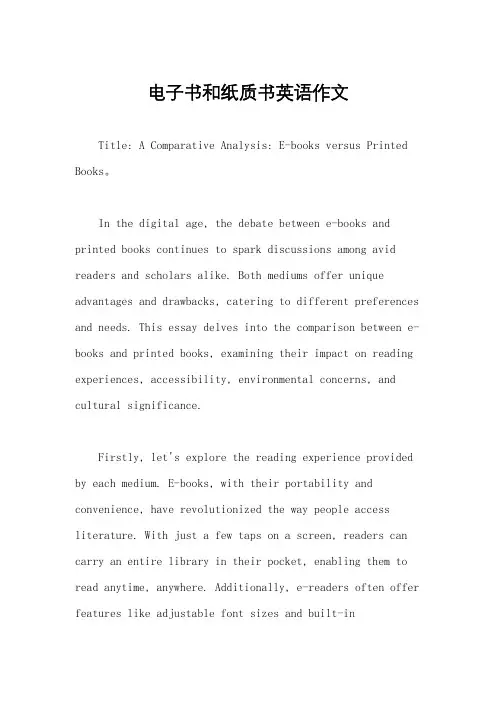
电子书和纸质书英语作文Title: A Comparative Analysis: E-books versus Printed Books。
In the digital age, the debate between e-books and printed books continues to spark discussions among avid readers and scholars alike. Both mediums offer unique advantages and drawbacks, catering to different preferences and needs. This essay delves into the comparison between e-books and printed books, examining their impact on reading experiences, accessibility, environmental concerns, and cultural significance.Firstly, let's explore the reading experience provided by each medium. E-books, with their portability and convenience, have revolutionized the way people access literature. With just a few taps on a screen, readers can carry an entire library in their pocket, enabling them to read anytime, anywhere. Additionally, e-readers often offer features like adjustable font sizes and built-indictionaries, enhancing readability and comprehension for users. On the other hand, printed books provide a tactile experience that many readers find irreplaceable. The smellof ink on paper, the satisfaction of turning physical pages, and the visual appeal of a well-designed cover contributeto the immersive experience of reading a printed book. For some, nothing can compare to the sensation of holding a tangible book in their hands.Accessibility is another crucial aspect to consider. E-books have democratized access to literature by eliminating barriers such as geographical distance and availability. With an internet connection, readers can instantly download a wide range of titles, including rare or out-of-print books. This accessibility is especially beneficial for individuals with disabilities, as e-books can be easily customized to accommodate different needs, such asadjustable font sizes and audio narration. Conversely, printed books may be less accessible in certain regions orto individuals with mobility challenges. However, printed books have the advantage of not requiring electronicdevices or batteries, making them accessible even in remoteareas without electricity or internet connectivity.Environmental considerations also come into play when comparing e-books and printed books. E-books are often touted as a more eco-friendly option due to their digital nature, which eliminates the need for paper production and transportation. By reducing paper consumption, e-books contribute to forest conservation and minimize carbon emissions associated with the printing industry. Furthermore, e-books eliminate the environmental impact of book disposal, as digital files do not contribute tolandfill waste. However, it's essential to acknowledge that e-readers and electronic devices have their own environmental footprint, stemming from manufacturing, energy consumption, and electronic waste disposal. Printed books, while requiring paper production, can be more sustainable if sourced from responsibly managed forests and recycled materials. Additionally, printed books hold cultural significance as tangible artifacts of humanhistory and creativity.In conclusion, the debate between e-books and printedbooks reflects the evolving landscape of reading in the digital age. Both mediums offer unique advantages and contribute to the rich tapestry of literary culture. Ultimately, the choice between e-books and printed books depends on individual preferences, reading habits, and values. Whether one prefers the convenience of e-books or the sensory experience of printed books, both mediums playa vital role in fostering literacy, knowledge dissemination, and cultural enrichment.。
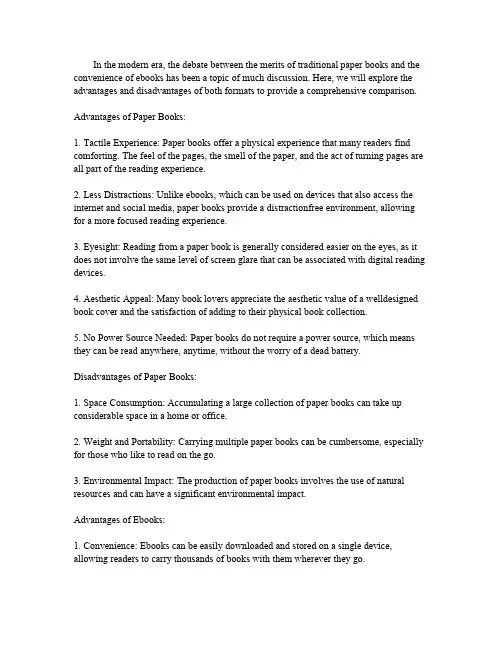
In the modern era,the debate between the merits of traditional paper books and the convenience of ebooks has been a topic of much discussion.Here,we will explore the advantages and disadvantages of both formats to provide a comprehensive comparison.Advantages of Paper Books:1.Tactile Experience:Paper books offer a physical experience that many readers find comforting.The feel of the pages,the smell of the paper,and the act of turning pages are all part of the reading experience.2.Less Distractions:Unlike ebooks,which can be used on devices that also access the internet and social media,paper books provide a distractionfree environment,allowing for a more focused reading experience.3.Eyesight:Reading from a paper book is generally considered easier on the eyes,as it does not involve the same level of screen glare that can be associated with digital reading devices.4.Aesthetic Appeal:Many book lovers appreciate the aesthetic value of a welldesigned book cover and the satisfaction of adding to their physical book collection.5.No Power Source Needed:Paper books do not require a power source,which means they can be read anywhere,anytime,without the worry of a dead battery. Disadvantages of Paper Books:1.Space Consumption:Accumulating a large collection of paper books can take up considerable space in a home or office.2.Weight and Portability:Carrying multiple paper books can be cumbersome,especially for those who like to read on the go.3.Environmental Impact:The production of paper books involves the use of natural resources and can have a significant environmental impact.Advantages of Ebooks:1.Convenience:Ebooks can be easily downloaded and stored on a single device, allowing readers to carry thousands of books with them wherever they go.2.Searchability:Ebooks often come with search functions that make it easy to find specific passages or words within the text.3.Adjustable Font Size:Readers can adjust the font size and style to suit their reading preferences,which can be particularly beneficial for those with visual impairments.4.Instant Access:With ebooks,there is no need to wait for a physical copy to be delivered they can be purchased and read almost immediately.5.CostEffectiveness:Ebooks are often less expensive than their paper counterparts,and some are even available for free.Disadvantages of Ebooks:1.Device Dependency:To read an ebook,one needs a compatible device,which can be a limitation for those without access to such technology.2.Battery Life:Ebooks require a power source,which can be inconvenient if the device runs out of battery during reading.3.Potential for Distractions:The same device used for reading ebooks can also access the internet,social media,and other distractions,which can interrupt the reading experience.4.Eyesight Concerns:Prolonged exposure to screens can cause eye strain and discomfort, although this can be mitigated with proper screen settings and regular breaks.5.Ownership and Accessibility:Ebooks are often subject to digital rights management DRM,which can limit how and where they can be read,and in some cases,may prevent permanent ownership of the content.In conclusion,the choice between paper books and ebooks often comes down to personal preference and the specific needs of the reader.While paper books offer a traditional and tactile reading experience,ebooks provide the convenience and portability of digital technology.Both formats have their place in the world of reading,and many readers choose to use a combination of both to suit their lifestyle and reading habits.。
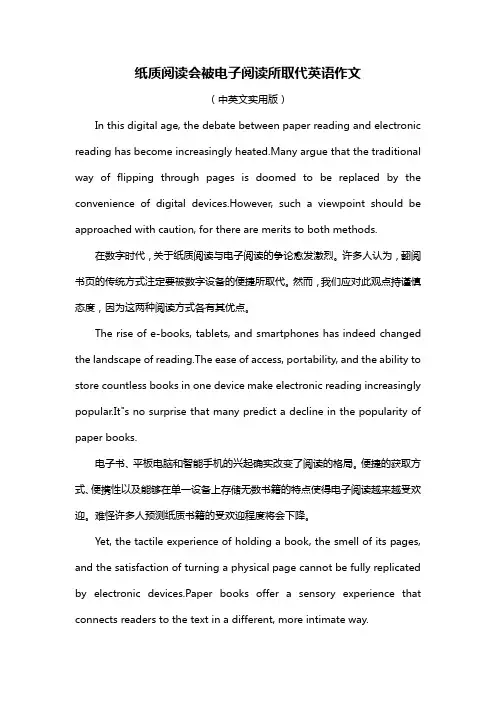
纸质阅读会被电子阅读所取代英语作文(中英文实用版)In this digital age, the debate between paper reading and electronic reading has become increasingly heated.Many argue that the traditional way of flipping through pages is doomed to be replaced by the convenience of digital devices.However, such a viewpoint should be approached with caution, for there are merits to both methods.在数字时代,关于纸质阅读与电子阅读的争论愈发激烈。
许多人认为,翻阅书页的传统方式注定要被数字设备的便捷所取代。
然而,我们应对此观点持谨慎态度,因为这两种阅读方式各有其优点。
The rise of e-books, tablets, and smartphones has indeed changed the landscape of reading.The ease of access, portability, and the ability to store countless books in one device make electronic reading increasingly popular.It"s no surprise that many predict a decline in the popularity of paper books.电子书、平板电脑和智能手机的兴起确实改变了阅读的格局。
便捷的获取方式、便携性以及能够在单一设备上存储无数书籍的特点使得电子阅读越来越受欢迎。
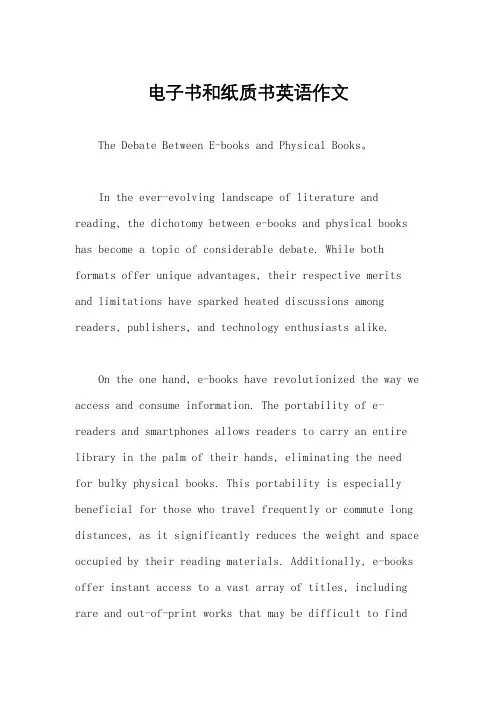
电子书和纸质书英语作文The Debate Between E-books and Physical Books。
In the ever-evolving landscape of literature and reading, the dichotomy between e-books and physical books has become a topic of considerable debate. While both formats offer unique advantages, their respective merits and limitations have sparked heated discussions among readers, publishers, and technology enthusiasts alike.On the one hand, e-books have revolutionized the way we access and consume information. The portability of e-readers and smartphones allows readers to carry an entire library in the palm of their hands, eliminating the needfor bulky physical books. This portability is especially beneficial for those who travel frequently or commute long distances, as it significantly reduces the weight and space occupied by their reading materials. Additionally, e-books offer instant access to a vast array of titles, including rare and out-of-print works that may be difficult to findin physical form. The ability to search within the text and adjust font size and brightness also enhances the reading experience for many users.Moreover, e-books are often more environmentally friendly than physical。
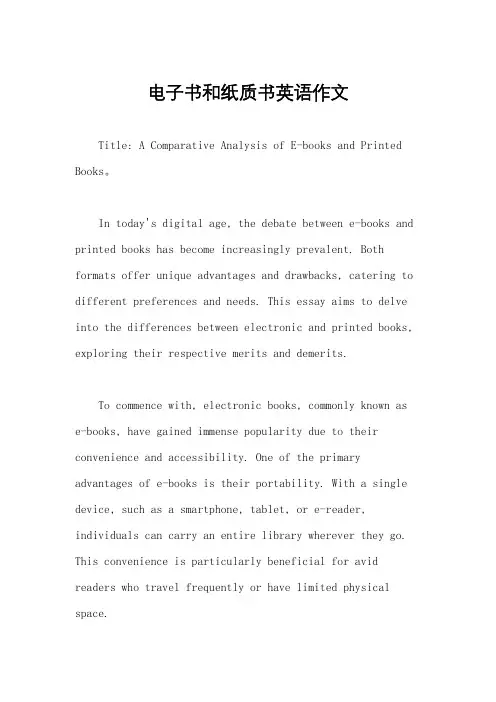
电子书和纸质书英语作文Title: A Comparative Analysis of E-books and Printed Books。
In today's digital age, the debate between e-books and printed books has become increasingly prevalent. Both formats offer unique advantages and drawbacks, catering to different preferences and needs. This essay aims to delve into the differences between electronic and printed books, exploring their respective merits and demerits.To commence with, electronic books, commonly known as e-books, have gained immense popularity due to their convenience and accessibility. One of the primary advantages of e-books is their portability. With a single device, such as a smartphone, tablet, or e-reader, individuals can carry an entire library wherever they go. This convenience is particularly beneficial for avid readers who travel frequently or have limited physical space.Moreover, e-books often provide additional featuresthat enhance the reading experience. For instance, readers can adjust font sizes, customize background colors, and utilize built-in dictionaries for instant definitions. Additionally, e-books may incorporate multimedia elements like audio narration and interactive graphics, offering a multi-sensory engagement that traditional books cannot match.Furthermore, e-books contribute to environmental sustainability by reducing paper consumption and carbon emissions associated with printing and transportation. With the increasing concern for ecological preservation, the digital format aligns with efforts to minimize waste and conserve resources.On the other hand, printed books offer a tangible and tactile experience that appeals to many readers. The sensory aspect of holding a physical book, feeling its pages, and inhaling the scent of paper and ink evokes a sense of nostalgia and intimacy. For some, this sensoryengagement enhances the emotional connection to the text and fosters a deeper appreciation for the reading experience.Additionally, printed books do not require electronic devices or batteries, making them accessible even in areas with limited electricity or internet connectivity. This accessibility is particularly crucial in regions where technological infrastructure is underdeveloped or unreliable.Moreover, printed books hold cultural and historical significance, serving as tangible artifacts of human knowledge and creativity. Libraries and bookstores, with their shelves lined with printed volumes, serve as communal spaces that foster intellectual exchange and collective learning. The physical presence of books contributes to the ambiance and character of these spaces, enriching the overall cultural landscape.However, printed books have inherent limitations compared to their electronic counterparts. They are bulkierand less portable, requiring dedicated storage space and careful handling to prevent damage. Additionally, printed books lack the customizable features of e-books, such as adjustable font sizes and search functions, which can be particularly beneficial for individuals with visual impairments or specific reading preferences.In conclusion, the choice between e-books and printed books ultimately depends on individual preferences, circumstances, and priorities. While e-books offer unparalleled convenience, customization, and environmental sustainability, printed books provide a sensory, cultural, and historical experience that resonates with many readers. Ultimately, both formats contribute to the rich tapestry of human literary expression, each offering its unique blend of advantages and charm. As technology continues to evolve, the coexistence of e-books and printed books ensures that readers can enjoy diverse reading experiences tailored to their needs and preferences.。
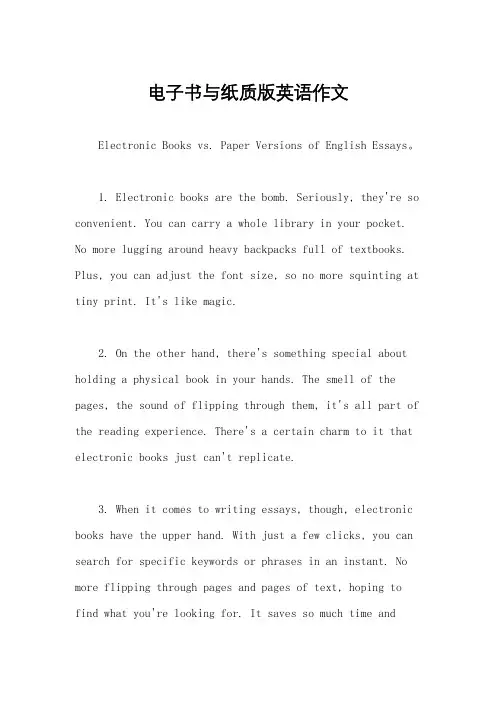
电子书与纸质版英语作文Electronic Books vs. Paper Versions of English Essays。
1. Electronic books are the bomb. Seriously, they're so convenient. You can carry a whole library in your pocket. No more lugging around heavy backpacks full of textbooks. Plus, you can adjust the font size, so no more squinting at tiny print. It's like magic.2. On the other hand, there's something special about holding a physical book in your hands. The smell of the pages, the sound of flipping through them, it's all part of the reading experience. There's a certain charm to it that electronic books just can't replicate.3. When it comes to writing essays, though, electronic books have the upper hand. With just a few clicks, you can search for specific keywords or phrases in an instant. No more flipping through pages and pages of text, hoping to find what you're looking for. It saves so much time andfrustration.4. But let's not forget about the joy of underlining and highlighting in a paper book. There's something satisfying about physically marking up the text, making it your own. It helps with comprehension and retention too.It's like having a conversation with the author, leaving your thoughts and reactions right there on the page.5. Another advantage of electronic books is the ability to access additional resources with just a tap. You can instantly look up definitions, translations, or evenrelated articles. It's like having a personal research assistant right at your fingertips. It's a game-changer for writing essays.6. However, there's a certain nostalgia associated with paper books. Remember the days of dog-earing pages and writing notes in the margins? It's a personal touch that electronic books can't replicate. It's like leaving a piece of yourself behind in the book, a little reminder of your journey through the text.7. In conclusion, both electronic books and paper versions have their pros and cons. Electronic books offer convenience, searchability, and access to additional resources. On the other hand, paper books provide a tactile experience, a sense of nostalgia, and the joy of marking up the text. So, whether you prefer the digital world or the traditional one, there's no denying that both have their place in the world of English essays. It's all aboutfinding what works best for you.。
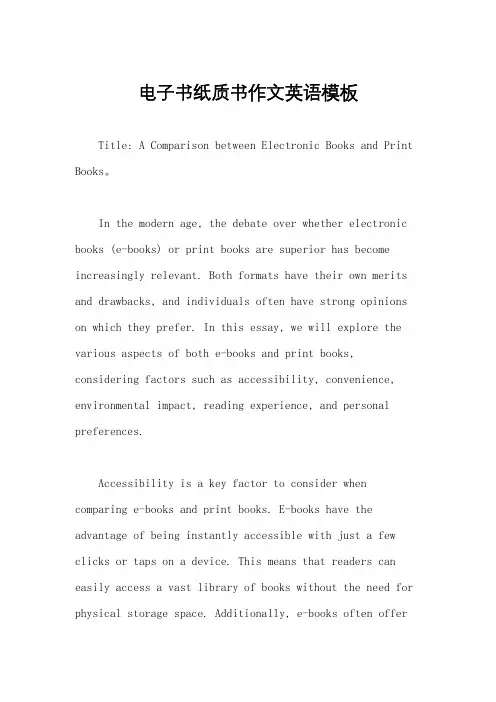
电子书纸质书作文英语模板Title: A Comparison between Electronic Books and Print Books。
In the modern age, the debate over whether electronic books (e-books) or print books are superior has become increasingly relevant. Both formats have their own merits and drawbacks, and individuals often have strong opinions on which they prefer. In this essay, we will explore the various aspects of both e-books and print books, considering factors such as accessibility, convenience, environmental impact, reading experience, and personal preferences.Accessibility is a key factor to consider when comparing e-books and print books. E-books have the advantage of being instantly accessible with just a few clicks or taps on a device. This means that readers can easily access a vast library of books without the need for physical storage space. Additionally, e-books often offerfeatures such as adjustable font sizes and built-in dictionaries, making them more accessible to individuals with visual impairments or those learning a new language.On the other hand, print books also have their own accessibility benefits. Unlike e-books, print books do not require access to electronic devices or an internet connection. They can be read anytime, anywhere, without worrying about battery life or screen glare. Furthermore, print books can be shared and borrowed easily, allowing for a sense of community among readers.Convenience is another important factor to consider. E-books are often praised for their convenience, as they allow readers to carry an entire library of books in a single lightweight device. This is particularly advantageous for travelers or individuals with limited storage space. Additionally, e-books can be purchased and downloaded instantly, eliminating the need to visit a physical bookstore.However, some argue that print books offer a differentkind of convenience. There is a tactile satisfaction that comes with holding a physical book in one's hands, flipping through its pages, and annotating passages with handwritten notes. Furthermore, print books do not rely on technology and are not subject to issues such as software glitches or device compatibility.Environmental impact is a concern that is often raised in discussions about e-books versus print books. E-books are often touted as a more environmentally friendly option, as they do not require paper, ink, or transportation for distribution. This can help reduce deforestation and carbon emissions associated with the production and transportation of print books.However, the environmental impact of e-books is not negligible. E-readers and other electronic devices require the mining of precious metals and other natural resources for their production. Additionally, the energy consumption associated with manufacturing and using these devices contributes to greenhouse gas emissions. Furthermore, electronic devices have a limited lifespan and often end upin landfills once they become obsolete.In terms of reading experience, opinions vary widely between e-books and print books. Some readers prefer the convenience and versatility of e-books, while others argue that nothing can replace the sensory experience of reading a print book. Factors such as the smell of ink and paper, the weight of the book in one's hands, and the satisfaction of turning physical pages all contribute to the appeal of print books for many readers.Ultimately, the choice between e-books and print books boils down to personal preference. Some individuals may prefer the convenience and accessibility of e-books, while others may value the sensory experience and aesthetic appeal of print books. Regardless of which format one prefers, it is important to recognize that both e-books and print books have their own unique advantages and drawbacks. In an increasingly digital world, the coexistence of both formats allows readers to choose the option that best suits their needs and preferences.In conclusion, the debate over electronic books versus print books is multifaceted, with arguments to be made for both formats. While e-books offer advantages in terms of accessibility and convenience, print books provide a unique reading experience and have a lower environmental impact in some respects. Ultimately, the choice between e-books and print books is a personal one, and readers should consider their own preferences and priorities when making a decision.。
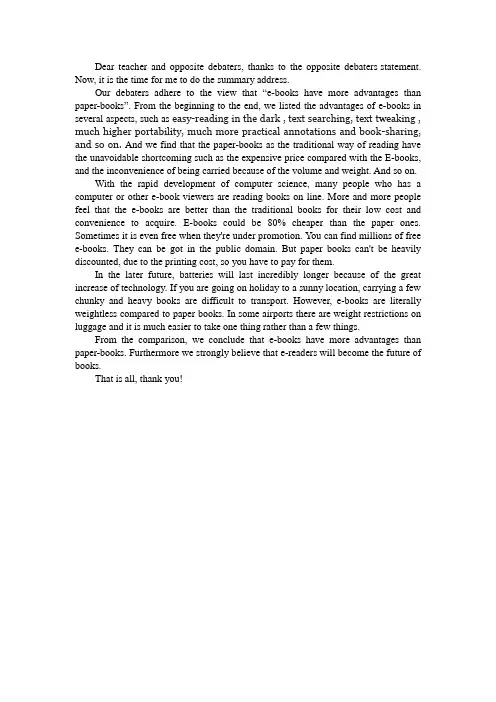
Dear teacher and opposite debaters, thanks to the opposite debaters statement. Now, it is the time for me to do the summary address.Our debaters adhere to the view that “e-books have more advantages than paper-books”. From the beginning to the end, we listed the advantages of e-books in several aspects, such as easy-reading in the dark , text searching, text tweaking , much higher portability, much more practical annotations and book-sharing, and so on. And we find that the paper-books as the traditional way of reading have the unavoidable shortcoming such as the expensive price compared with the E-books, and the inconvenience of being carried because of the volume and weight. And so on.With the rapid development of computer science, many people who has a computer or other e-book viewers are reading books on line. More and more people feel that the e-books are better than the traditional books for their low cost and convenience to acquire. E-books could be 80% cheaper than the paper ones. Sometimes it is even free when they're under promotion. You can find millions of free e-books. They can be got in the public domain. But paper books can't be heavily discounted, due to the printing cost, so you have to pay for them.In the later future, batteries will last incredibly longer because of the great increase of technology. If you are going on holiday to a sunny location, carrying a few chunky and heavy books are difficult to transport. However, e-books are literally weightless compared to paper books. In some airports there are weight restrictions on luggage and it is much easier to take one thing rather than a few things.From the comparison, we conclude that e-books have more advantages than paper-books. Furthermore we strongly believe that e-readers will become the future of books.That is all, thank you!。
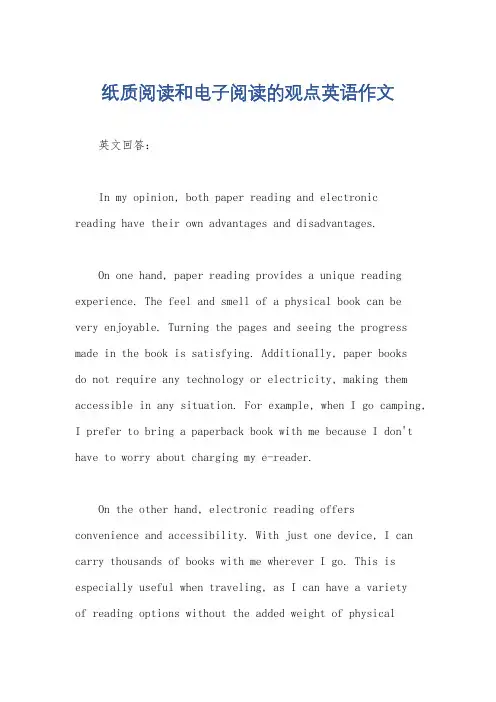
纸质阅读和电子阅读的观点英语作文英文回答:In my opinion, both paper reading and electronicreading have their own advantages and disadvantages.On one hand, paper reading provides a unique reading experience. The feel and smell of a physical book can be very enjoyable. Turning the pages and seeing the progress made in the book is satisfying. Additionally, paper booksdo not require any technology or electricity, making them accessible in any situation. For example, when I go camping, I prefer to bring a paperback book with me because I don't have to worry about charging my e-reader.On the other hand, electronic reading offers convenience and accessibility. With just one device, I can carry thousands of books with me wherever I go. This is especially useful when traveling, as I can have a varietyof reading options without the added weight of physicalbooks. Furthermore, e-books often have features like adjustable font size and built-in dictionaries, making it easier to read and understand the content. For instance, when I come across a difficult word while reading an e-book, I can simply tap on the word to get its definition.However, there are some drawbacks to electronic reading as well. One of the main concerns is eye strain. Staring at a screen for a long time can cause discomfort and fatigue. Moreover, the blue light emitted by electronic devices can disrupt sleep patterns. Another disadvantage is thepotential for distractions. When reading on a tablet or smartphone, it is easy to get distracted by notificationsor other apps. For example, I often find myself checking social media or emails while trying to read on my e-reader.In conclusion, both paper reading and electronicreading have their own merits and drawbacks. Paper reading provides a unique sensory experience and does not require any technology, while electronic reading offers convenience and accessibility. Ultimately, the choice between the two depends on personal preferences and circumstances.中文回答:在我看来,纸质阅读和电子阅读都各有优劣。
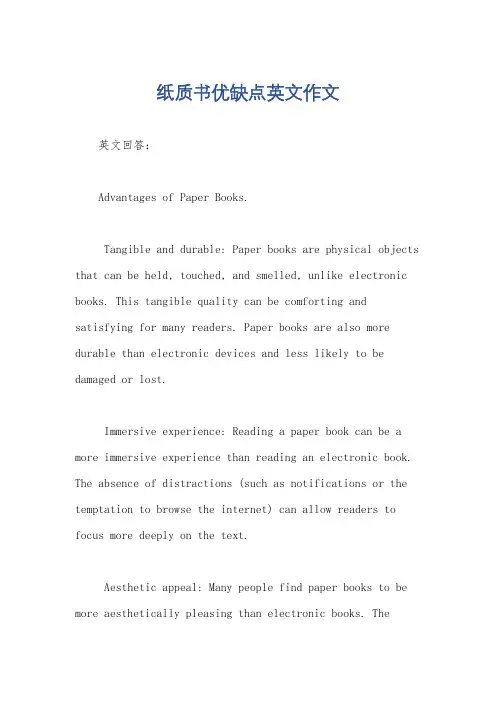
纸质书优缺点英文作文英文回答:Advantages of Paper Books.Tangible and durable: Paper books are physical objects that can be held, touched, and smelled, unlike electronic books. This tangible quality can be comforting and satisfying for many readers. Paper books are also more durable than electronic devices and less likely to be damaged or lost.Immersive experience: Reading a paper book can be a more immersive experience than reading an electronic book. The absence of distractions (such as notifications or the temptation to browse the internet) can allow readers to focus more deeply on the text.Aesthetic appeal: Many people find paper books to be more aesthetically pleasing than electronic books. Thephysical form of a book, with its cover, pages, and typography, can be a work of art in itself.Personalization: Paper books can be personalized in ways that electronic books cannot. Readers can add notes, highlights, and drawings to their physical copies, making them unique and meaningful.No eye strain: Reading from a printed page does not put as much strain on the eyes as reading from a screen. This can be especially important for people who spend a lot of time reading.Disadvantages of Paper Books.Limited portability: Paper books are bulky and heavy, which can make them difficult to carry around. This is especially problematic for people who have to commute or travel frequently.Environmental impact: The production of paper books requires the use of trees, which can contribute todeforestation. Additionally, the manufacturing and disposal of paper books can generate waste and pollution.Cost: Paper books can be more expensive thanelectronic books. This is especially true for new releases or rare editions.Storage space: Storing a large collection of paper books can require a lot of space. This can be a problem for people who live in small spaces or who have limited storage options.Susceptibility to damage: Paper books can be easily damaged by water, fire, or other environmental factors. This can be a major concern for collectors or people who own rare or valuable books.中文回答:纸质书的优点。
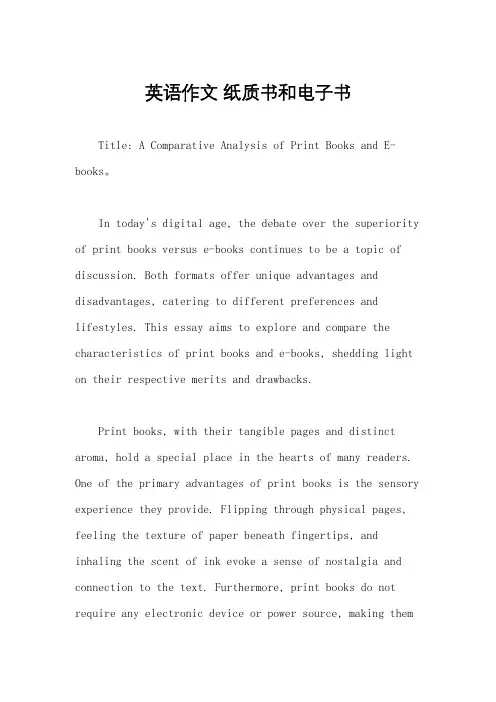
英语作文纸质书和电子书Title: A Comparative Analysis of Print Books and E-books。
In today's digital age, the debate over the superiority of print books versus e-books continues to be a topic of discussion. Both formats offer unique advantages and disadvantages, catering to different preferences and lifestyles. This essay aims to explore and compare the characteristics of print books and e-books, shedding light on their respective merits and drawbacks.Print books, with their tangible pages and distinct aroma, hold a special place in the hearts of many readers. One of the primary advantages of print books is the sensory experience they provide. Flipping through physical pages, feeling the texture of paper beneath fingertips, and inhaling the scent of ink evoke a sense of nostalgia and connection to the text. Furthermore, print books do not require any electronic device or power source, making themaccessible in various environments, including areas with limited electricity or internet access. Additionally, print books are favored by some for their aesthetic appeal, as they contribute to the ambiance of bookshelves and libraries, creating a visually pleasing environment for readers.On the other hand, e-books offer a different set of benefits that appeal to modern readers. One of the most significant advantages of e-books is their portability and convenience. With the rise of smartphones, tablets, and e-readers, individuals can carry an entire library in the palm of their hand, allowing for easy access to a vast array of literature wherever they go. Moreover, e-books often offer features such as adjustable font sizes, bookmarks, and search functions, enhancing the reading experience and accommodating individual preferences. Additionally, e-books provide a more sustainable option compared to print books, as they eliminate the need for paper production, reducing environmental impact.Despite their advantages, e-books also face criticismand challenges. One common concern is the potential for digital distractions while reading on electronic devices. With notifications, emails, and other applications vyingfor attention, maintaining focus on the text can bedifficult for some readers. Additionally, there is a senseof impermanence associated with e-books, as digital files can be susceptible to technological obsolescence or lossdue to hardware failure or digital rights management issues. Furthermore, the lack of physical presence in e-books diminishes the tactile experience enjoyed by print book enthusiasts, leading to a perceived loss of authenticityand connection with the text.In conclusion, both print books and e-books offerunique advantages and disadvantages, catering to diverse reader preferences and lifestyles. Print books provide a sensory experience and aesthetic appeal, while e-booksoffer portability, convenience, and sustainability. Ultimately, the choice between print books and e-books depends on individual preferences, circumstances, and the desired reading experience. Whether one prefers the feel of paper beneath their fingertips or the convenience ofcarrying a virtual library in their pocket, both formats continue to coexist, enriching the world of literature and accommodating the diverse needs of readers worldwide.。
纸质书PK电子书的英语作文纸质书PK电子书的英语作文Write an essay with the title “reading books in Printed Form or on Computer” in which you should1) analyze the strong points and the weak points of each one;2) tell your own preference and your reasons本题是一篇标题加提纲式作文。
文章的主题和基本框架在指导语中给出了要求。
文章要求以“读印刷书还是电子书”为题(同时也是文章的主题):(一)分析印刷书和电子书的优缺点;(二)说明你自己的喜好及其原因。
【参考范文】The popularization of computer has made it possible to read books on computer. With it, there is much discussion about whether e-books will replace traditional print-on-paper books.Some people say they like only e-books, which are quicker and more convenient to get and use. To get a needed book, one has to spend much time or money in searching for buying it in bookstores, but one can just type in the title, author or other related information of the book to find it in minuteson internet. Sometimes one can even read the full content to a digitized book free of charge or instantly discuss about a book in an online forum. Moreover, a lot of information of books can be stored in small compact disc, which is easy to take.Other people, however, think printed books are still necessary. In thefirst place, too much time in front of the computer can cause eyestrain or increase radiation risks. Second, a printed book can be read at your convenience .One can read in bed before sleep or during a boring journey, without fussing with a computer.In sum, since e-books and printed books have their respective advantages and can complement each other, I would like to combine the two ways to meet different needs. For quick reference, a digitized book will probably be useful.To appreciate a poem or a novel, I prefer the traditional way of reading on printed books.感谢您的阅读,祝您生活愉快。
英语作文纸质书电子书Paper Books vs. E-books。
In today's digital age, the debate between paper books and e-books has become a hot topic. Some people argue that e-books are the future and will eventually replace paper books, while others believe that paper books will always hold a special place in our hearts. Both formats have their own advantages and disadvantages, and it is important to consider these factors when choosing which one is best for you.Paper books have been around for centuries and have a timeless appeal. There is something special about holding a physical book in your hands, flipping through the pages, and feeling the texture of the paper. Many people enjoy the experience of browsing through a bookstore, smelling the scent of new books, and discovering hidden gems on the shelves. Paper books also have a sense of permanence –once you own a paper book, it is yours to keep forever, andyou can pass it down to future generations as a cherished heirloom.On the other hand, e-books offer a new level of convenience and accessibility. With just a few clicks, you can download an e-book and start reading it instantly. E-books are also lightweight and portable, allowing you to carry an entire library with you wherever you go. In addition, e-books often offer features such as adjustable font sizes, built-in dictionaries, and the ability to highlight and take notes, making them a practical choicefor students and avid readers.Another factor to consider is the environmental impact of both formats. Paper books require the use of trees for their production, as well as energy and resources for printing and transportation. On the other hand, e-books are a more sustainable option, as they do not require any physical materials and can be distributed electronically, reducing the carbon footprint associated with traditional publishing.In terms of cost, e-books are often cheaper than paper books, as they do not incur printing and distribution expenses. This makes e-books a more budget-friendly option for those who love to read but want to save money. However, some people argue that the cost of e-readers and other devices needed to access e-books can be a barrier for some readers, especially those in developing countries or with limited access to technology.Ultimately, the choice between paper books and e-books comes down to personal preference. Some people may prefer the tactile experience of reading a paper book, while others may appreciate the convenience and practicality ofe-books. In reality, both formats can coexist and offer unique benefits to readers.In conclusion, the debate between paper books and e-books is ongoing, and both formats have their own strengths and weaknesses. Whether you prefer the nostalgia of a paper book or the convenience of an e-book, the most important thing is to keep reading and enjoying the wonderful worldof literature. After all, the love of reading is what truly matters, regardless of the format in which it is consumed.。
书籍与电子书之争英语作文Title: The Battle Between Books and E-BooksIn the realm of reading, a debate has been raging for years between two formats that have captured the hearts of many: books and e-books. Both have their unique advantages and disadvantages, making it difficult for readers to choose one over the other. In this essay, we will explore the pros and cons of both formats and try to determine which one reigns supreme in the battle between books and e-books.Let's start with the traditional book. For centuries, people have been reading physical books made of paper and bound together with covers. One of the main advantages of books is their tactile experience. Holding a book, turning its pages, and feeling the weight of it in your hands can provide a sense of satisfaction that cannot be replicated by an electronic device. Additionally, books do not require any power source or internet connection, making them ideal for situations where these resources are limited or non-existent.Another advantage of books is their durability. With proper care, a book can last for generations, becoming a cherishedfamily heirloom passed down from one generation to another. Moreover, books do not suffer from technical issues such as battery life or software updates, ensuring that they remain functional regardless of technological advancements.On the other hand, e-books have become increasingly popular in recent years due to their convenience and accessibility. With an e-book reader or tablet, readers can carry thousands of books in their pockets without worrying about the physical space required to store them all. This makes e-books perfect for travelers who want to take their entire library with them on vacation or business trips.E-books also offer several features that enhance the reading experience. For example, many e-readers come equipped with built-in dictionaries and highlighting tools, allowing readers to easily look up unknown words or mark important passages for later reference. Furthermore, e-books often include adjustable font sizes and styles, making them more accessible to individuals with visual impairments or preferences for different text presentations.However, e-books also have some drawbacks. One major issue is the potential strain on eyesight caused by prolongedexposure to electronic screens. Unlike books, which reflect light rather than emitting it directly into our eyes, e-readers emit blue light that can cause eye fatigue and even contribute to long-term vision problems if not managed properly. Additionally, e-books can be expensive if purchased individually, although subscription services like Amazon Kindle Unlimited offer access to a vast library at a reasonable monthly fee.In conclusion, both books and e-books have their merits and demerits. While books provide a tactile experience and durability that e-books cannot match, e-books offer unparalleled convenience and accessibility along with useful features that enhance the reading experience. Ultimately, the choice between books and e-books depends on personal preferences and lifestyle needs. As technology continues to advance, it is likely that both formats will coexist and cater to different segments of the reading population.。
Will E-books Replace Paper-books 电子书会取代纸质书吗大学英语作文Will E-books Replace Paper-books 电子书会取代纸质书吗大学英语作文With the quick development of technology, people are surrounded by all kinds of electronic devices. And more people aretending to read books by computers or phones rather than go to library to read books. Hence, there is a hot debate on whether e-books will replace paper-books. Some people think that e-books will prevail since e-book is so convenient that we can take it to anywhere to read. Some argue that paper-book would notbe replaced for paper-book takes the responsibility to pass down knowledge. Formy perspective, I think e-book will replace paper-book eventually. Reasons arelisted below.Firstly, e-book is more convenient than paper-book. Nowadays, almost all people have cell-phones or computers, so they can just download e-books immediate ly. Wherever they go, they don’t have to take a heavy paper-book but just take their device out and enjoy the fun of reading.Secondly, e-book is much cheaper than paper-book. If we need to buy paper- books, then we have to pay a lot of money on them. However on the contrary, we can search e-books on the Internet and just need to pay little or even get e-books we want for free.All in all, e-book will replace paper-book in the near future because itis more convenience and much cheaper than the paper-book.随着科技的快速发展,人们被各种各样的电子产品所包围。
In recent years, more and more people are choosing to read e-books rather than paper books.Do the advantages outweigh the disadvantages of this trend?You should give reasons for your answer using your own ideas and experience. Write at least 250 words.Sample Answer:Nowadays, some people prefer to read e-books instead of reading printed books. In my opinion, reading e-books is more advantageous than reading paper based books.Firstly, if you prefer to read on your mobile devices, laptops or other hand-held devices, you can read books everywhere. Moreover, you do not have to carry books in your bag.Secondly, some publishing companies have not chosen to publish the paper based recently because they think the production of paperback books is more expensive than the e-book version. Therefore, the prices of e-books are cheaper than the price of paper books. For this reason, particularly University students opt to purchase e-books.Finally, e-books are easier to purchase and with the facility of online purchase, anyone gets an ebook whenever s/he wants. It was environment-friendly as it requires no papers, ink and saves the trees that would have been used to produce papers.On the Other hand, many excellent books have been published only on paper based. Thus, if you would like to read them on your mobile devices, unfortunately, you could not avail them. In addition, many old books are not published any longer even paper based. You can find them only in the library. For example, in my Universityyears, I had to read a book that is about business history and I wanted to read it on my iPhone. I searched it on the internet but I could not find it even in paper based. So I had to go to the library and I could find it in there.In conclusion, even if some books are published only paper based and sometimes it is tough to find e-books version and in my view, reading e-books are more advantageous than reading paper books. Furthermore, I would argue that day today the popularity of e-books will increase.。
高中英语作文《阅读纸质书籍与电子书籍的差异》Title: The Differences Between Reading Printed Books and E-books In this digital age, the way we read has drastically changed.Traditional printed books have been replaced by their electronic counterparts, e-books.While both have their advantages and disadvantages, there are notable differences between the two.Firstly, the most obvious difference is the medium itself.Printed books are tangible objects that we can hold in our hands, while e-books are digital files that can be read on electronic devices such as tablets and e-readers.This difference brings about various implications.For one, printed books have a certain aesthetic appeal that e-books lack.The smell of a book, the feel of its pages, and the sight of its cover can evoke a sense of nostalgia and appreciation for the traditional reading experience.Furthermore, many readers argue that printed books are more conducive to deep reading and comprehension.They claim that the act of flipping through physical pages helps in better retaining information and focusing on the text.On the other hand, e-books offer convenience and accessibility.They can be easily downloaded, stored, and carried around, allowing readers to have a wide range of books at their fingertips.E-readers also have features like adjustable font size and backlighting, which can enhance the reading experience for individuals with visual impairments or different preferences.Another difference lies in the environmental impact.Printed books require trees to be cut down for paper production, contributing to deforestation and carbon emissions.In contrast, e-books do not consume physical resources, thus reducing environmental impact.However, the production and disposal of electronic devices also have environmental consequences, such as electronic waste.Lastly, the interactivity between the reader and the text differs between printed and e-books.E-books offer various interactive features, such as highlighting, note-taking, and dictionary lookups, which can aid in better understanding and engagement with the content.Printed books, on the other hand, allow for more personal annotations and physical interactions, such as underlining, dog-earing pages, or writing in the margins.In conclusion, while both printed and e-books have their advantages and disadvantages, the choice between the two ultimately depends on personal preference and reading habits.Printed books offer a tangible and aesthetic experience, while e-books provide convenience and accessibility.As technology continues to evolve, it is possible that the future will bring about new ways to merge the benefits of both formats, enhancing our reading experience even further.。
Dear teacher and opposite debaters, thanks to the opposite debaters' statement. Now, it is the time for me to do the summary address. Our debaters hold the view that "e-books are better than paper books", from the beginning to the end, we listed the advantages of e-books in several aspects, such as convenience, cost, fashion and so on. Many of us read e-books nowadays. We all know that e-books have been becoming a trend.
And we found that the paper-books have many shortcomings in carrying, correcting, storing, cost and so on. Many trees needed to make the paper books, which make the paper books more expensive. And our consumers must pay for the transport fee. From the comparison, we can foresee that e-books are better than paper books.
Besides, no trees are required to manufacture paper for the pages of e-books, which is a very useful way to protect the environment; e-books take up less space. You practically don't need any space to store them. You don't need a library or a room for them. You can store hundreds and thousands of e-books in your computer. With today technology you can read e-books you loved wherever you are, on the bus, train, airplane and while standing in line.
What’s more, for some latest and fashional readings, e-books best choices. That’s all, thank you.。